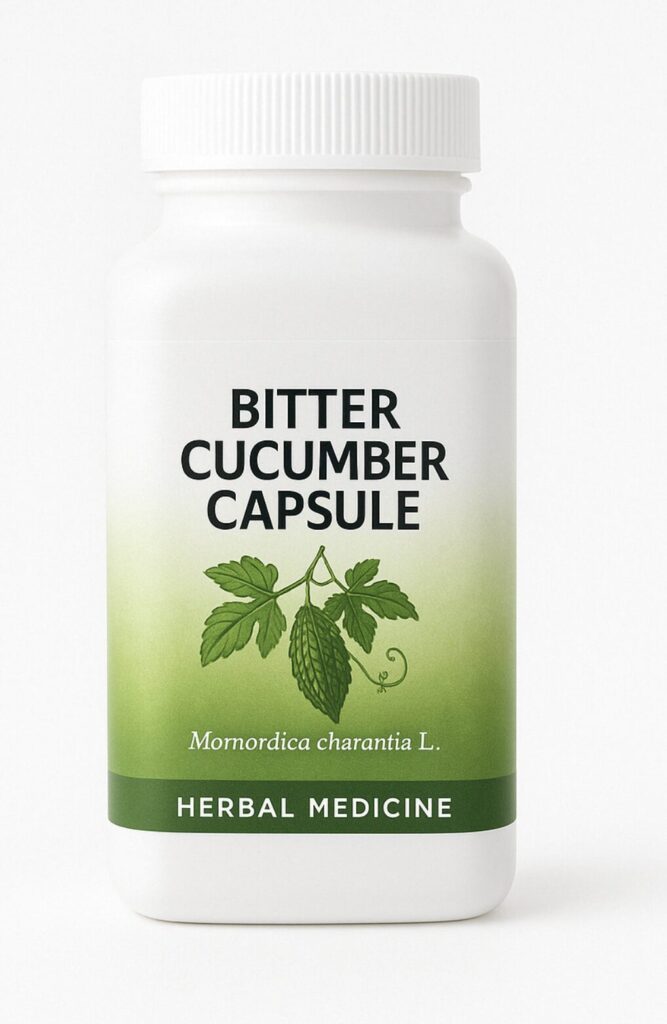The first time I tried bitter melon, I was in my twenties, sitting in a dimly lit Asian restaurant with a friend who had that look—you know, the one people get right before they drop some culinary dare on you. He grinned and said, “You’ve never tasted something this bitter… but somehow it’s good.”
Honestly, that sounded like a terrible pitch. “So it tastes bad but you like it?” Cool, pass the water.
But I’m the type who tries things. If a food claims to offend your taste buds while secretly improving your health, well, that’s my kind of paradox. So I took a bite.
He was right. It was insanely bitter. But weirdly… I liked it.
That was my gateway into the world of Momordica charantia—also known as bitter cucumber, bitter gourd, or that angry-looking green fruit that seems like it should be poisonous but isn’t.

In Thailand, it’s been a medicinal staple for centuries. In biohacker circles, it’s a rising star—praised for its blood sugar-regulating, inflammation-fighting, gut-friendly benefits. And somehow, Thai grandmas and San Francisco tech bros have both landed on the same plant. That’s when you know something’s up.
So what is this spiky, bitter little wonder anyway?
What Is Momordica charantia?
Momordica charantia L. is a tropical vine that thrives in Southeast Asia, Africa, and the Caribbean. The fruit it produces looks like a cucumber that got into a bar fight—bumpy, bright green, and straight-up intimidating.
It belongs to the Cucurbitaceae family (same gang as pumpkins and zucchini), but unlike its sweeter cousins, this thing has a taste profile that’s more “herbal slap to the face” than salad-friendly.
Depending on where you are, you might hear it called:
- Bitter cucumber (Thailand)
- Bitter melon (US/Western countries)
- Karela (India)
- Goya (Okinawa/Japan)
It’s been used for generations as food and medicine. And no surprise: traditional dishes that include it are usually built to mellow out its bitterness—either with strong spices, fatty meats, or fermentation. That should tell you something right away: people didn’t eat this because it was delicious. They ate it because it did something.
Traditional Uses in Thai Medicine
In Thailand, bitter cucumber isn’t just another vegetable. It’s part of the natural pharmacopoeia—a go-to remedy for everything from digestion to blood sugar control, liver detox, and even general vitality. You’ll find it brewed into teas, cooked into soups, or sliced thin and sun-dried like medicinal jerky.
Traditional Thai medicine doesn’t isolate compounds or track glucose curves—it works on patterns, balance, and energetic properties. Bitter foods, in this framework, help “clear heat,” reduce inflammation, and support internal cleansing.
And yeah, that sounds like vague herbal voodoo until you realize that modern science is now confirming a lot of it in surprisingly specific ways.
The Science: What Modern Research Is Saying
So we’ve established that bitter melon is the kind of thing you eat once and never forget—either because your taste buds never forgive you, or because your blood sugar quietly thanks you an hour later. Let’s unpack what the actual research says, minus the lab coat lingo.
Blood Sugar Regulation and Insulin Sensitivity
This is where bitter melon really earns its stripes.
Several compounds in the fruit—charantin, polypeptide-p, and vicine—have been shown to help reduce blood glucose levels. Think of them as nature’s half-assed but surprisingly effective insulin mimics. They either help your cells take up glucose more efficiently or slow down glucose absorption in the gut.
A 2012 meta-analysis in Journal of Ethnopharmacology found that bitter melon has modest but consistent hypoglycemic effects, particularly in type 2 diabetics. Not as dramatic as metformin or insulin, but it’s doing something. For people with insulin resistance or borderline metabolic issues, that’s a big deal.
Bonus: it seems to improve insulin sensitivity, which means your body uses the insulin it already has more effectively. That’s basically the holy grail of metabolic health—less insulin, better results.
Anti-Inflammatory and Antioxidant Effects
Chronic inflammation is the background noise of every modern disease—from heart problems to cognitive decline. Bitter melon appears to quiet that noise.
Studies have shown it downregulates pro-inflammatory cytokines like TNF-α and IL-6—basically the molecules that scream “everything is on fire” inside your body. At the same time, it boosts antioxidant enzymes like superoxide dismutase (SOD) and catalase, helping mop up cellular waste before it turns into bigger problems.
Translation: your cells can chill out, repair, and do their jobs without freaking out all the time.
Weight Loss and Metabolic Benefits
Now here’s where things get spicy.
Animal studies show that bitter melon extract can reduce body weight, visceral fat, and improve lipid profiles, even in high-fat diet models. It seems to tweak fat metabolism, possibly by activating AMPK, the energy sensor your cells use to decide whether to burn fat or store it.
In humans, the evidence is early but promising. People taking bitter melon supplements over several weeks saw reductions in waist circumference, fasting glucose, and triglycerides. Not magic. But meaningful.
Also, a few studies suggest it may support gut health by modulating microbiota—though that research is in its infancy and mostly based on rats who probably never signed up for a bitter melon cleanse.
How Biohackers Are Using It Today
When a weird-looking fruit from Southeast Asia starts showing up in Reddit threads, podcast monologues, and supplement stacks, you know it’s officially entered the biohacker bloodstream. Bitter melon has made that leap—from traditional remedy to modern protocol—with all the usual trimmings: capsules, extracts, powdered blends, and way too much enthusiasm.
Capsules, Powders, and Teas
Most biohackers aren’t slicing up fresh bitter melon for dinner. They’re popping it in capsule form—because convenience matters more than culinary bravery.
The most common format is standardized extract capsules, typically dosed at 500–1,000 mg, taken once or twice daily. Some people go for powdered versions to mix into smoothies (bless their taste buds), and a few still swear by the old-school approach: bitter melon tea, steeped like a punishment and sipped for its supposed purity.
Timing-wise, it’s often taken before meals, especially carb-heavy ones, to blunt post-meal blood sugar spikes. Think of it as an herbal glucose bodyguard—one that doesn’t wear a suit, but definitely blocks the punch.
Potential Stacking Ideas
Because no supplement lives in a vacuum (especially not in the supplement-obsessed world of biohackers), bitter melon often gets stacked with other blood sugar-modulating compounds. Here are a few popular combos:
- Berberine + Bitter Melon
This is the metabolic Batman and Robin. Berberine activates AMPK and mimics metformin. Bitter melon adds support via insulin sensitivity and gut modulation. Together, they pack a punch without tanking your energy. - Inositol + Bitter Melon
Especially popular with PCOS or insulin-resistant individuals. Inositol helps with cellular insulin signaling. Bitter melon boosts the whole system’s efficiency. - Magnesium + Bitter Melon
Magnesium is crucial for insulin action, and bitter melon can round out the stack with its glucose-lowering effects. It’s like giving your cells a pep talk and then handing them a toolkit.
The appeal here is clear: bitter melon offers a natural, low-side-effect way to support metabolic health, especially for those flirting with prediabetes, insulin resistance, or just trying to hack their glucose curves after sushi night.
The Catch: Side Effects and Things to Watch
Look, just because something is natural doesn’t mean it’s automatically safe—or appropriate for everyone. Hemlock is natural. So are scorpions. Context matters.
Bitter melon may not be dangerous in the dramatic sense, but it does come with a few caveats worth knowing.
1. It Can Drop Blood Sugar… Maybe Too Much
If you’re already taking medications for blood sugar—like metformin, insulin, or sulfonylureas—adding bitter melon on top can amplify the effect. This can lead to hypoglycemia (low blood sugar), which is just as problematic as high blood sugar.
Symptoms include dizziness, shakiness, fatigue, and the urge to murder someone over a granola bar. If you’re already medicated, talk to a doctor before throwing bitter melon into the mix.
2. Not Ideal for Pregnant People
There’s some concern around uterine stimulation and potential abortifacient effects in high doses. While the data isn’t definitive, the traditional advice across multiple cultures is the same: avoid bitter melon during pregnancy. Better safe than metabolically optimized and in trouble.
3. GI Distress Is Possible
For some people—especially when taking high doses—it can cause stomach pain, diarrhea, or gas. Again, not everyone, but if your gut starts acting like you just slammed a triple espresso and a kale smoothie, you’ve probably overdone it.
4. It’s Not a Long-Term Crutch
Bitter melon should be a support tool, not a dependency. If you’re leaning on it to survive your daily cinnamon roll habit, that’s like fixing a leaky roof with a bath towel. Fix the behavior. Use the plant as backup.
5. Quality Matters
Because it’s now trendy, the supplement market is full of under-dosed, under-tested, over-hyped bitter melon products. Look for standardized extracts (ideally with charantin or polypeptide-p content clearly labeled), and buy from brands that show third-party testing or actual sourcing information. No mystery powder from “somewhere in Asia.”
Why This Weird-Looking Fruit Is Worth Knowing About
Here’s the deal: Momordica charantia isn’t trendy because it tastes good. It’s trendy because it works—and it’s been working for a long time.
Thai grandmas weren’t running clinical trials. They were using what worked, passing it down, and letting experience speak for itself. Now we’ve got the science to catch up, and it’s saying: this spiky little fruit can actually improve insulin sensitivity, reduce inflammation, support weight loss, and maybe even help your cells handle the metabolic dumpster fire that is the modern Western diet.
That doesn’t mean it’s a miracle. It means it’s a tool—a natural compound that nudges your biology in the right direction. No glowing health halos. No magic pills. Just bitter, hard-earned benefits.
If you’re someone trying to optimize glucose levels, cut post-meal crashes, or explore safer, evidence-backed herbal support—bitter melon is worth a look.
Just don’t expect it to taste good. That part’s not negotiable.
Found this an interesting read? Then check out this post: 5 Cheap Herbs That Boost Adiponectin Levels for Improved Metabolic Health

